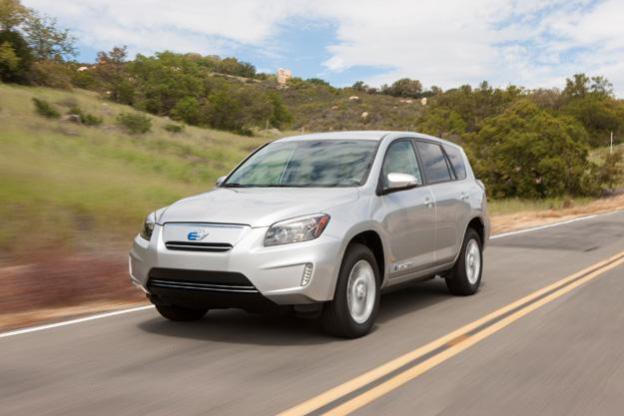 The Toyota RAV4 EV may be the only electric SUV on the market, but Toyota is still having trouble selling it. Sales are down to roughly 30 units a month, so the company is offering significant discounts on the EV to generate more traffic in showrooms.
The Toyota RAV4 EV may be the only electric SUV on the market, but Toyota is still having trouble selling it. Sales are down to roughly 30 units a month, so the company is offering significant discounts on the EV to generate more traffic in showrooms.
On paper, the RAV4 EV looks like something customers would flock to. Based on Toyota’s popular small crossover, it has an electric motor and lithium-ion battery pack from Tesla Motors.
Despite being significantly larger, the RAV4 EV hustles to 60 mph faster than a Nissan Leaf: 8.6 seconds (or 7.0 seconds in sport mode) against the Nissan’s 9.4. It also offers an impressive 103 mile range, although the battery pack takes six hours to charge with a Level 2 (240 volt) charger.
Toyota doesn’t have lofty sales goals, either. The Japanese carmaker only plans on selling 2,600 RAV4 EVs over three years; after that they will go out of production. It was originally meant as a stopgap effort (hence the Tesla tie-in) while future products were developed, but Toyota has since decided to get out of the EV game altogether.
The RAV4’s high price is probably the culprit. The base price is $49,800, and a three-year lease for $599 a month with a $3,499 down payment is also being offered. In comparison, a regular 2012 RAV4 starts at $22,650.
The RAV4 EV is eligible for $2,500 California and $7,500 federal tax credits, and now Toyota will offer a deduction of its own. Between now and January 1, 2013, buyers can get 0 percent financing and a $5,000 rebate, plus a $2,500 loyalty bonus for returning Toyota customers.
If a buyer qualifies for all of those rebates and discounts, he or she will cut $17,500 from the RAV4 EV’s price. At $32,300, it looks like a much better deal compared to the $35,200 Leaf.
The RAV$ EV is only sold in California, ground zero for green cars, so its unique body style won’t necessarily make it a standout. On the other hand, who doesn’t love a deal?


